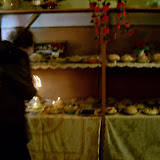I have been thinking of punishment a lot lately. In particular, I have been thinking about how my school hasn’t any. Of course there are some so-called things that pass as punishment in our school but they have no substance and if the kids ever found out, we would have full out anarchy in our school. How can this be you ask? Simple: it’s a product of population mathematics.
Schools, whether in America, Britain, Timbuktu or Bobov dol, run on an economy of attendance. You attend school, study hard, pass tests and move on to the next grade. After repeating this cycle 12 or so times, you graduate -you are certified- and you go out into “the real world” and either get a job or enter college to repeat the cycle. If you fail any of the prerequisites for completing a step (not attending, not studying, not passing tests), you have to spend another year attempting to complete the step or you get removed from school. If you are removed from school, you lose your chance at certification, you don’t get a job and you end up mooching off your parents for the rest of your life. In order to maintain a conducive learning environment, schools also threaten expulsion if you do not behave in the school. It’s a simple economic system really; if you want to “buy” certification, you have to “pay” with effort in the form of good behavior and studying.
The problem is, here in Bobov dol, this system has broken down because they have taken away the granddaddy of punishments: expulsion. Whether you like to admit it or not, our education system ultimately comes down to this threat: “Do this or you will fail!” Like many schools in Bulgaria, ours can no longer say this because we don’t have enough students. Due to population decline, if we kick out any more students, we will not have enough students to continue the grade. That means that we wouldn’t have enough hours for teachers and we they would lose their jobs. Without the threat of expulsion, there is little you can do to motivate a student.
It goes something like this:
Me: “You were late today. Please come on time tomorrow.”
Student: “Why?”
Me: “Because you are missing material in class.”
Student: “So?”
Me: “You will not learn the material.”
Student: “So?”
Me: “You will do badly on the test.”
Student: “So?”
And that’s where the next logical answer is “You will fail.” Most logical thinking students would at least have reason here to pause and consider the weight of this punishment. Unfortunately here the next answer is “…” NOTHING! There is nothing more I can do beyond this step. They got me! This kind of dialogue is repeated daily on everything from skipping classes, not doing homework, kicking our brand new whiteboards (happened today…) to fighting in class and cheating on tests.
Maybe I am an unimaginative teacher but if you take away the ultimate punishment, how can you motivate students to learn the modal verbs and past perfect continuous tense?
Something I have realized lately is that punishment is a form of love. No, seriously. As much as the kid in me tries to convince me otherwise, punishment is an act of love. I am not taking here about cruelty or revenge or sadism. I mean punishment as a part of justice. When you, as an individual or society, stand up and punish someone who commits a crime, you are showing that you care about the future and want it to be better. You are loving the person who was wronged; you are restoring their faith that someone cares about them and their live. When you punish the aggressor, you are loving them by making them aware of their error and hopefully dissuading them from doing it again. I was reading the Letter of Paul to the Romans the other day and was struck by Paul’s words. He talks about the punishment of the idolators and Israel and how God’s wrath was an act of love. Justice is obviously a virtue, it is even one of the 4 Cardinal Virtues of the Roman Catholic Church (Bonus points: Anyone know the other 3?). But Justice cannot exist if Punishment does not flow into and from it. There can be no Justice if injustice is not punished and Justice is corrupted if Punishment is unjust. I had never thought of it that way but it makes perfect sense.
If this is hard to imagine think of a small child. Say the small child steals a candy bar from a store. You as the parent find out later that day. You have two options. You can pretend you didn’t see it and do nothing, or you can punish the child and make him take the bar back to the store and have him apologize. Of course the second option is embarrassing, awkward and painful for both you and the child, but it is an act of love. You are teaching the child that stealing is not okay. They will learn that they should not steal and hopefully grow up to be a more moral person. The storeowner is reassured that people care about him and his business. Society as a whole benefits because the child will grow up into someone who appreciates justice and the storeowner will continue to believe in justice.
I think a society that has lost the capacity for love would first stop punishing people. They would not even have enough love for each other to say that pain and hate will not be accepted in the community. They would not care enough about the future to stop problems before they balloon out of control. Unfortunately I see that in my school. Kids fight in the halls between classes and teachers do nothing. Students skip classes by smoking in the cafeteria and teachers say nothing. Today, in my 12th grade class, a kid kicked one of our brand new whiteboards. The class is divided into two groups and he is in the other group. As he was getting up to go to the other classroom he, for no apparent reason at all, kicked the board. He walked out and I chased him down. There were two other teachers who saw him do it. One teacher came out and followed me. When I caught the kid I grabbed him by the arm and started yelling at him and came dangerously close to throwing him up against the wall and literally choking him. I was surprised at how close I was. I was trying to say something to him in Bulgarian but nothing came out. I was hoping one of the other three teachers (an extra one was in the hallway) would do something, but they did nothing. Nothing. I was so shocked and dismayed that I have been bummed all day. Could this town be so gone that it doesn’t even have the concept of Justice and Punishment, basic ingredients of love? I pray to God that it isn’t.
Subscribe to:
Post Comments (Atom)


4 comments:
Spare the rod and spoil the child. When I got older, Mom started calling it 'tough love.' She was in her Dr. Dobson phase. By punishing injustice you honor Truth. A culture that cannot honor Truth is surely turning down a dangerous road. It is easier to stand up and honor Truth than to passively ignore injustice.
"For evil to triumph, the good need do nothing." I have no idea who said that, but it's one of my favorite quotations.
However, Andrew, I do want to add that, in "the biz" we call it "discipline." Discipline involves rewarding what is good (rare even here in the US) and punishing what is bad. So much of the functioning of an education system depends on belief in the future. What is sad is a people that, as a people, (still) has so little of that.
Answer to the bonus question:
fortitude, prudence, temperance
Ding ding, you are correct Meghan. You can collect your prize on your next visit to Bulgaria!
Post a Comment